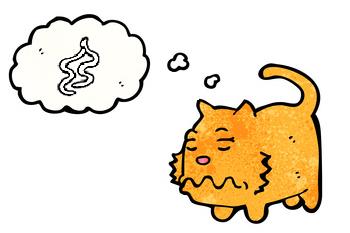
How do you know if your cat has worms? What are the symptoms of worms in cats? Do you look for worms in your cat’s stool and seek out other signs? Do you take stool samples to your veterinarian?
Here is a list of general symptoms of worms in cats and what they mean:
- Lack of any symptoms. Many cats carry worms and show no signs at all. Cats also develop resistance against roundworms, and they usually display no symptoms with heartworms. The truth is, you can’t know for certain, unless vet confirmed it.
- Mucus or blood in the stool is one of the most common signs or worms in cats and dogs. Usually, this is when cat owners first notice that something is not right. Though blood in feces can mean many things, it’s a good idea to visit a veterinarian before applying over-the-counter de-worming medicine, especially if you tried it already and it did not help.
- A bloated abdomen is a typical symptom of roundworms, which are the most common parasite in cats. Do not assume that your cat is just fat. You can tell the difference, because in the case of worms, only the belly will be bloated. The rest of the cat’s body may be in a good condition or even skinny.
- Increased appetite develops due to worms eating part of your cat’s meals. In such cases, your cat may consume a lot of food without gaining any extra weight. Even more, he may even lose weight. If increased appetite is your cat’s only symptom, see here for other possible causes.
- Decreased appetite can also be a sign your cat has worms, despite the previous point. In the case of large infestations, your cat may feel too sick to care about food. Take your cat to the vet immediately, because if a cat starves for even a day it can have an irreversible impact on its liver.
- Weight loss is highly likely, because your cat has to share his food with worms and might not be getting enough for himself.
- Diarrhea is a natural bodily response to get rid of internal parasites. If your cat has a diarrhea for more than a day, you should visit a veterinarian as soon as you can. Diarrhea is a frequent symptom of many diseases, and worm infestation is among the most innocent of them.
- Vomiting is an other way to purge the body. Sometimes, adult worms may be found in a cat’s vomit, which points to the severity of the infestation. Take your cat’s vomit sample to your veterinarian, and learn here about other reasons why cats throw up.
- Coughing, breathing difficulties and similar symptoms may be present in the case of roundworms, as their larvae migrate through the cat’s lungs. Of course, similar symptoms may be present due to many other medical conditions. People commonly mistake coughing as a cat getting a cold. Cats do not catch colds in the same way humans do. Coughing in cats usually signals something more serious.
- Parasites are visible in stool or vomit in the case of severe infestations only. Many cat owners believe this is the primary symptom and that not finding them means the cat is clean. This isn’t true. Worms in the stool or vomit just means the infestation is large.
- Decreased activity is a manifestation of abdominal pain, discomfort and ill feeling.
- Poor general health of the cat can be observed. Since your cat has to share food, minerals, vitamins and other nutrients with “his” worms, his immunity is also likely to decrease.
If, based on symptoms, you suspect that your cat has worms, you should visit a veterinarian. Take your cat and his stool and/or vomit samples (place them in a zipper bag) with you. Most signs mentioned here can also signal other, more serious medical conditions, and applying worm medicine in an inappropriate situation may do harm to your cat’s health.
Note that your cat won’t have all of the worm symptoms mentioned above. It’s likely that a cat with even severe worm infestation will display only few or no signs from the list. This is because there are different species of internal parasites and that cats can develop resistance to worms, showing no apparent symptoms.
